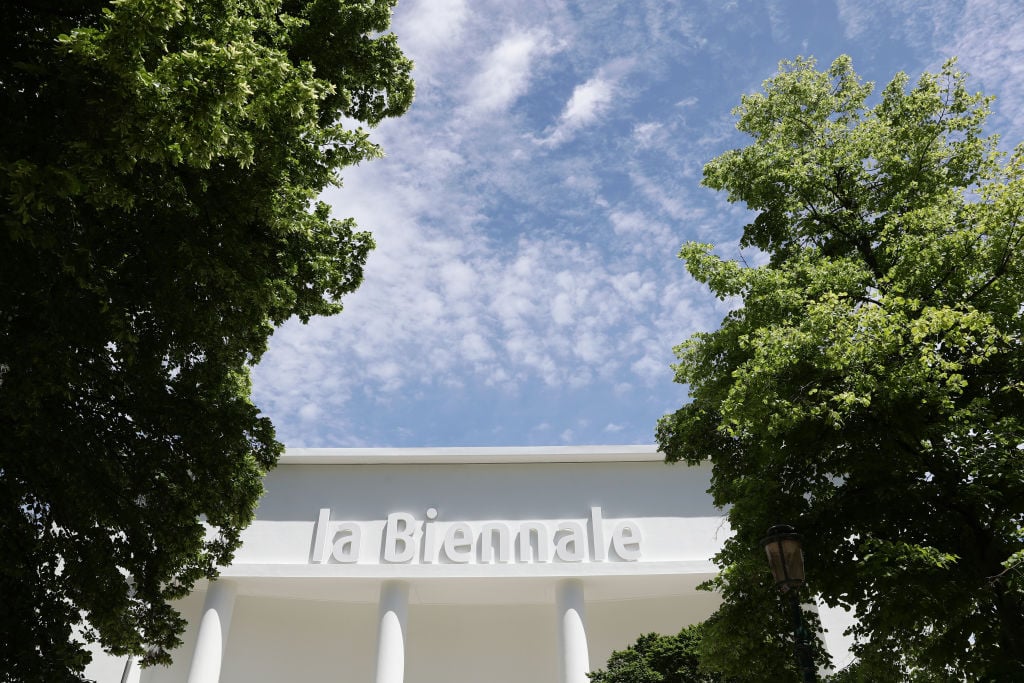
Organizers of the Venice Biennale have said they will not exclude Israel in response to calls to shut down the Israel pavilion in light of the human toll in the ongoing Israel-Hamas conflict.
Additionally, the organizers have said that they will also not exclude Iran, following another demand issued by the Woman Life Freedom Italy (WLFI) movement. WLFI called for Iran to be excluded over the Islamic republic’s crackdown on women and other dissenting voices in the wake of the death of Mahsa Amini, a woman detained in 2022 by Iran’s morality police for not wearing her lawfully required hijab. She died in custody, sparking widespread protests.
“It is with great astonishment and regret that we learned from the Venice Biennale website that, the Islamic Republic of Iran will be among the national participants with a curator and an artist chosen by the Iranian regime,” the Woman Life Freedom Italy movement said in a statement on Instagram.
“La Biennale di Venezia would like to specify that all countries recognized by the Italian Republic may autonomously request to participate officially,” the event organizers said in a statement. “Consequently, La Biennale may not take into consideration any petition or call to exclude the participation of Israel or Iran in the coming 60th International Art Exhibition.”
The WLFI statement follows an open letter published on February 26 by the Art Not Genocide Alliance (ANGA), which quickly garnered more than 8,000 signatures from artists and arts professionals around the world. It claimed that “any work that officially represents the state of Israel is an endorsement of its genocidal policies.”
ANGA’s letter noted that apartheid South Africa had been barred from participation in the Biennale until 1993 and that the last edition’s curator spoke out against Russia after its invasion of Ukraine in 2022. In response, the biennial’s organizers said that the decision to close the Russian Pavilion at the 59th International Art Exhibition in 2022 “was made by the commissioner and the curator designated by the Minister of Culture of the Russian Federation, which announced that it would not participate in the coming 60th International Art Exhibition.”
Venice Biennale organizers further pointed out that there are two projects featuring the participation of Palestinian artists, “one of which was selected as one of the 30 Collateral Events approved at the complete discretion of the curator Adriano Pedrosa, whose artistic decision is final and irrevocable.”
Following ANGA’s open letter, the Italian Culture Minister Gennaro Sangiuliano responded by expressing support for Israel, saying: “Israel not only has the right to express its art, but it has the duty to bear witness of its people precisely at a time like this when it has been attacked in cold blood by merciless terrorists.”
Israeli Culture Minister Miki Zohar, a member of controversial Prime Minister Benjamin Netanyahu’s Likud party, has affirmed that the country would be participating in the biennale and thanked Sangiuliano for his support, the Washington Post reported.
“Art is a bridge between cultures and between peoples,” Zohar said in his statement. “And we will continue to firmly set out against attempts to boycott Israel in international forums.”
The calls made against Israel’s and Iran’s participation are notable at a geopolitical level because Israel is currently at war with Hamas, the Palestinian militia considered by the U.S. and its allies to be a terrorist organization. The U.S. has been accused of fighting a proxy war with Iran, which has allegedly provided funds and other support to Hamas and other Shiite Muslim militant groups, like Lebanon’s Hezbollah.